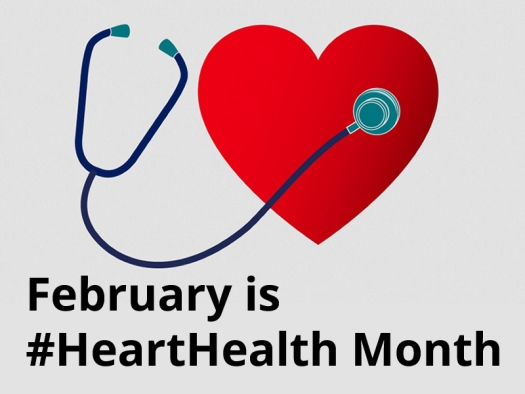FebruaryHeartHealthMonth.jpg

Illustration from PNGALL
February is #HeartHealth Month
Knowing the following facts could literally save a life.
Female bodies have unique heart health risks. Here’s what you may not know.
Did you know that heart health research has only recently started focusing on the unique differences between men and women?
Let’s break this down:
- Heart disease is the #1 killer of women worldwide. Yes, the leading cause of death – even in high-income countries like the U.S. This statistic spans race and ethnicity, which means it’s something we all need to pay attention to.
- Menopause dramatically impacts heart risk. Estrogen naturally protects the heart. That’s why, if two women are the same age, the postmenopausal woman’s risk of a cardiovascular event is double that of the premenopausal woman. And those hot flashes and night sweats? They’ve been specifically linked to an increased risk of high blood pressure.
- Women have other unique heart health risk factors. Conditions like gestational diabetes, preeclampsia, PCOS, and endometriosis can increase heart disease risks. These are challenges male bodies never deal with.
- Heart symptoms are often misdiagnosed in women. Studies show women with heart disease symptoms are twice as likely as men to be told that it’s just ‘stress’ or ‘anxiety.’
- Heart attacks present differently in women. Sure, chest pain is common, but women often experience less obvious symptoms like pain in the neck, jaw, throat, arm, or back, plus dizziness, nausea, heartburn, or sheer exhaustion.
Three Overlooked Nutrients Your Heart Will Love
You’ve heard about fiber and omega-3s, but what about these hidden gems for your heart?
- Vitamin K2. Vitamin K2 acts like a traffic controller for calcium. It helps direct calcium to where it belongs—your bones—reducing the risk of arterial calcification.. Food sources: Fermented foods (especially natto), hard cheeses, and egg yolks.
- Coenzyme Q10 (CoQ10). Your heart works 24/7, and CoQ10 is essential for keeping it energized. It powers your heart cells and protects them from oxidative damage. It’s especially important for anyone taking statins, as these medications can lower CoQ10 levels. Food sources: Fatty fish and organ meats.
- Magnesium. Known as “the great relaxer,” magnesium supports heart health by relaxing blood vessels and maintaining healthy blood pressure. Food sources: Leafy greens, nuts, seeds, and dark chocolate.
While you can get these nutrients from food, supplements can sometimes fill in the gaps. But supplements aren’t one-size-fits-all—they can interact with medications or other nutrients. That’s why working with a qualified practitioner is so important.
Lower Your Cardiovascular Risk
What if the root cause of heart disease isn’t actually high cholesterol but instead chronic inflammation (or “inflamm-aging”)?
Want to lower your cardiovascular risk? Start by tackling inflammation.
Because even though we all hear a lot about managing blood pressure and cholesterol, functional medicine digs deeper for the root cause.
One of those potential causes is often a low-grade and chronic inflammation – also known as “inflamm-aging.”
Research shows that this type of inflammation can trigger the formation of atherosclerotic plaques, which are responsible for heart attacks and strokes.
Aside from increased blood pressure, some other signs of chronic inflammation can be:
- Joint stiffness
- Muscle aches
- Skin rashes
- Autoimmunity
- Brain fog
- Anxiety or depression
I don’t recommend self-diagnosis (what you actually have is probably a lot less scary than what you think!).
The best way to address your health and root-causes that might put you at risk for a heart attack, stroke, or other chronic disease is to work with a qualified functional medicine practitioner. You can find licensed professionals at www.ifm.org. These practitioners typically individualize protocols to:
- Optimize your diet with anti-inflammatory foods like colorful fruits, veggies, and healthy fats
- Find enjoyable daily movement
- Customize supplements to save money and maximize impact
- Relieve stress in ways that work best for you
- Address specific risks based on your history, conditions, and labs
Are There Heart Health Mistakes You Might Be Making?
Sometimes what seems healthy might not be helping. Here are three common heart health mistakes:
- Only Doing Cardio. Cardio is great, but mix it up! Strength training boosts blood sugar control, and high-intensity bursts are linked to better heart health.
- Low-Fat Diet. Low-fat diets aren’t the answer. Healthy fats (like avocado and olive oil) fight inflammation and support cholesterol levels. Plus, “low-fat” foods are often packed with extra sugar.
- Stressing Out. Stress is not a badge of honor. It triggers cortisol release and can raise blood pressure over time.
In summary if you want better ways to support heart health:
- Mix up your workouts with strength, cardio, and High-intensity interval training (HIIT)
- Add heart-loving fats like avocado and salmon
- Find ways to de-stress and prioritize sleep
Three Super Simple Valentine Treats (that are heart-healthy too!)
Dark Chocolate Pomegranate Bites
Buy dark chocolate squares (70% cacao or higher) and top each square with a few pomegranate seeds. No melting or prep required!
Blood Orange Slices with Dark Chocolate Drizzle
Peel and slice a blood orange, then drizzle with melted dark chocolate and let it set.
Pomegranate Sparkling Water
Add a splash of pomegranate juice to plain sparkling water and garnish with a slice of lime.
Greek Yogurt and Berry Dip
Use plain Greek yogurt as a dip for fresh strawberries and blueberries.
Nutrition
So how do you know now much nutrition you are getting from your diet? For example what does 3 Grams of Omega-3 Fatty Acids look like?
Most adults only get 0.1 gram of omega-3s a day – WAY below the amount needed for heart, brain, and inflammation support. How can a person get enough?
Here’s what 3 grams (the sweet spot for heart health) looks like:
From seafood (EPA & DHA), pick one of these to hit 3 grams:
- 4 oz salmon, mackerel, or trout
- 7 small sardines
- 6 oz canned tuna
From plants (ALA), choose one of these to hit 3 grams:
- 2 tbsp flaxseeds or chia seeds
- 3 tbsp hemp seeds
- ¼ cup walnuts
But this is important: Your body converts less than 10% of ALA to EPA & DHA, so seafood or supplements are the most direct way to get benefits.
Stress
How about the impact of stress on heart health? Stress can be sneaky.
That’s why we need rituals (let me explain).
Life moves fast, and if we’re always racing around or glued to our phones, our bodies perceive danger.
More stress = more cortisol = higher risks for things like high blood pressure, weight gain, and hormonal issues. I’ve found the best way to break the stress cycle is to be intentional about it.
Like, with rituals.
I don’t mean anything elaborate. Rituals can be as simple as:
- Taking 5 minutes to stretch before breakfast
- Listening to music for 10 minutes after lunch
- Sipping a cup of tea in silence before bed
Why do rituals work?
- They tell your nervous system: “You’re safe.”
- They create calm through consistency.
Magnesium
Let’s look at the role of magnesium in heart health.
Less than half of Americans consume enough magnesium.
Only 48% of Americans consume the recommended amount of magnesium, but it’s essential for:
- Healthy blood pressure
- Stress management
- Better sleep
Low magnesium can also up your risk for heart disease, diabetes, and migraines.
Here are some magnesium-packed meal ideas:
- Power Snack: pumpkin seeds + almonds + chocolate + banana
- Salmon Dinner: Salmon + brown rice + spinach + avocado
- Veggie Bowl: Black beans + sweet potato + cashews + avocado
It’s hard to get the recommended 320 mg for women and 420 mg for men with processed foods but easy with healthy, whole foods!
References
American Heart Association News: The Slowly Evolving Truth About Heart Disease and Women. Published February 9, 2024.
Brush JE Jr, Hajduk AM, Greene EJ, Dreyer RP, Krumholz HM, Chaudhry SI. Sex Differences in Symptom Phenotypes Among Older Patients with Acute Myocardial Infarction. Am J Med. 2022 Mar;135(3):342-349.
Maserejian NN, Link CL, Lutfey KL, Marceau LD, McKinlay JB. Disparities in physicians' interpretations of heart disease symptoms by patient gender: results of a video vignette factorial experiment. J Womens Health (Larchmt). 2009 Oct;18(10):1661-7.
Behers BJ, Melchor J, Behers BM, et al. Vitamins and Minerals for Blood Pressure Reduction in the General, Normotensive Population: A Systematic Review and Meta-Analysis of Six Supplements. Nutrients. 2023;15(19):4223.
Qu H, Guo M, Chai H, Wang WT, Gao ZY, Shi DZ. Effects of Coenzyme Q10 on Statin-Induced Myopathy: An Updated Meta-Analysis of Randomized Controlled Trials. J Am Heart Assoc. 2018 Oct 2;7(19):e009835.
Liberale L, Badimon L, Montecucco F, Lüscher TF, Libby P, Camici GG. Inflammation, Aging, and Cardiovascular Disease: JACC Review Topic of the Week. J Am Coll Cardiol. 2022;79(8):837-847.
Paluch AE, Boyer WR, Franklin BA, et al. Resistance Exercise Training in Individuals With and Without Cardiovascular Disease: 2023 Update: A Scientific Statement From the American Heart Association. Circulation. 2024;149(3):e217-e231.
Stamatakis E, Ahmadi M, Biswas RK, et al. Device-measured vigorous intermittent lifestyle physical activity (VILPA) and major adverse cardiovascular events: evidence of sex differences. Br J Sports Med. Published online October 28, 2024.
Temporelli PL. Cardiovascular prevention: Mediterranean or low-fat diet?. Eur Heart J Suppl. 2023;25(Suppl B):B166-B170. Published 2023 Apr 21.
American Heart Association News: Are you Getting Enough Omega-3 Fatty Acids? Published June 30, 2023.
National Institutes of Health Office of Dietary Supplements. Magnesium Fact Sheet for Health Professionals. Updated June 2, 2022.
Revised by Joanne Quinn, PhD; content provided by Wellnesswriter.com.


